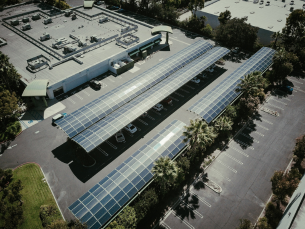Concept/Mission:
Energy is essential for life and for all living organisms. The sun, directly or indirectly, is the source of all the energy available on Earth. Our energy choices and decisions affect the Earth’s natural systems in ways that could lead and are already leading to massive damage, so it’s essential to carefully choose
our energy sources and go to Energy Efficiency techniques: use less energy to provide the same level of energy. It is therefore a method to reduce human greenhouse gas emissions.
Efficient use of energy is achieved primarily through a more efficient technology or process. Energy-efficient buildings, industrial processes and transport could reduce global energy needs by 2050 by one-third and help control global greenhouse gas emissions.
Therefore, all countries are oriented towards reducing the carbon footprint of companies and encouraging efficient use of energy: energy efficiency has become an integral part of design, maintenance, and industrial production, as well as the provision of services for civil use (energy efficiency in the building).
The Master’s course is designed to offer a multidisciplinary training path, in which the technical and engineering component is completed by an economic financial approach. The programme combines sustainable energy engineering with innovation and entrepreneurship. The term sustainable energy engineering comprises a wide array of practices, policies, and technologies (conventional, renewable, and alternative) aimed at providing energy at the lowest possible economic, environmental, and social cost. Emphasis is placed on dealing with energy engineering tasks with due consideration of related technical, environmental, and socio-economic issues. Strong emphasis is also put on the innovative and entrepreneurial aspects of the energy society, especially regarding how existing and new efficiency-improving innovations can be brought to market in different countries. The innovative aspects of the programme are related to both the advanced renewable energy concept globally as well as new businesses in the energy sector.
Duration: 12 Months
As with every Professional Master’s programme, the Course lasts 1.500 hours/year; of which:
• 300-400 dealing with lessons and seminars
• 250 individual study
• 350-400 stage/internship/applied research
• 400 thesis and exams
• Residual: Seminars
Academic Credits : 60 academic credits
Stage and Didactic Programme:
In the start-up phase of the course, educational offers aimed at the needs of each student and group work will be studied and prepared. Thus, it will be possible to start a tailored programme on an individual level, but more often working groups will be created which will carry out collective activities coordinated by teachers and tutors.
The individual work, the stage, mainly as an internship (applied research or field experience) and the thesis work will also be scheduled in line with the prearranged schedule.
Admission Requirements:
The course is mainly addressed to post-graduate students, experts and professionals involved in Renewable Energies activities. A detailed CV/Resume is also required.
Career Progression:
After graduation, the candidate has a Master’s programme endorsed by CIRPS which opens up strong prospects for the job market on a global scale. As an Innovative Sustainable Energy specialist, there are extensive opportunities for employment in international and domestic energy sector expert positions. Energy engineering companies have a growing need for future makers and an ever-increasing career potential to offer specialists, not only in conventional energy technologies but also in the growing business of renewable energies. Local and central governments, consultancy firms and NGOs are always on the lookout for these degree-bearers
Course Features
- Lectures 0
- Quizzes 0
- Duration 2023 / 2024
- Skill level Beginner
- Language English
- Students 1
- Assessments Yes






